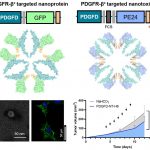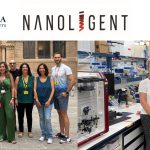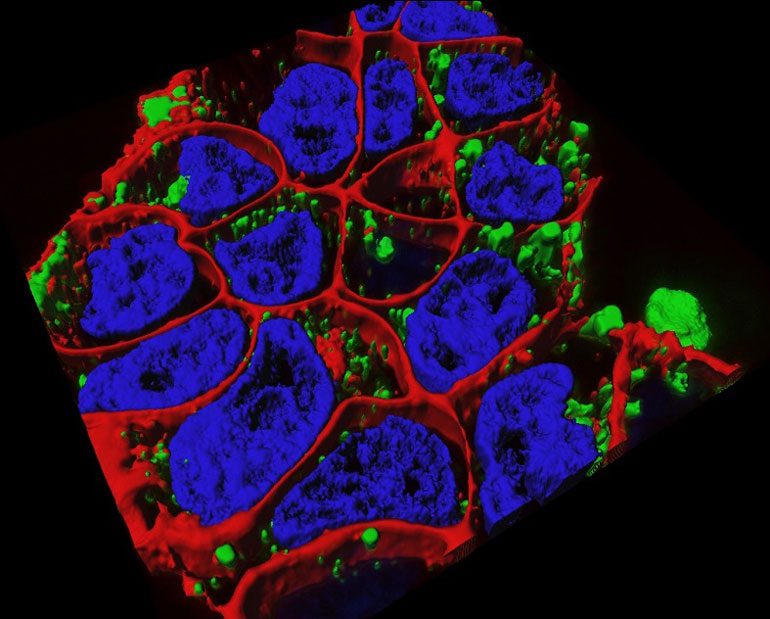Description
The PPP Unit is at the Institute of Biotechnology and Biomedicine of the Autonomous University of Barcelona (IBB-UAB). It counts with the necessary facilities for the design, production, and purification of recombinant proteins. This facility is coordinated by the Nanobiotechnology Group, led by Prof. Antonio Villaverde. It has both highly specialized personnel and the necessary equipment to offer a “tailored” service for the design, production, and purification of recombinant proteins using both prokaryotic and eukaryotic expression systems. Its location allows this service to be linked with other complementary services available within the university (Cell Culture, Cytometry, Production of Antibodies, Microscopy, Proteomic, and Bioinformatic, X-ray crystallography, and Microarray and Sequencing Services), as well as facilitating the management of subsequent uses of the produced protein.
Counts with a laboratory perfectly equipped for the bioproduction of proteins, another with all the necessary equipment for molecular cloning, plus one lab for the purification and characterization, and finally one for cryopreservation.
The PPP Unit has implemented the ISO9001 certification for standard quality control system.
 IQNet ISO 9001:2015 Certification PPP
IQNet ISO 9001:2015 Certification PPP
 AENOR ISO 9001:2015 Certification PPP
AENOR ISO 9001:2015 Certification PPP
Services
–
FOR THOSE SERVICES IDENTIFIED AS OUTSTANDING, AT LEAST 20% OF THEIR CAPACITY IS OPEN UNDER COMPETITIVE ACCESS. SEE ANNEX 1 OF ACCESS PROTOCOL FOR DETAILS ON % THE OF OPENNESS EACH SERVICE
U1. Services & Rates
Other projects
| Ref |
Title |
Funding Organism |
Unit Role |
| PI15/00272 |
Design of intelligent nanoconjugates for the treatment of metastatic colorectal cancer. |
Instituto de Salud Carlos III |
Participant |
| BIO2013-41019-P |
ENGINEERING OF PROTEIN NANOPARTICLES FOR THE DIRECT DELIVERY OF THERAPEUTIC PROTEINS AND NUCLEIC ACIDS |
MINECO |
Participant |
| 2014SGR-132 |
Basic and Applied Microbiology |
AGAUR |
Participant |
| BIO2016-76063-R |
DEVELOPMENT OF NONOSTRUCTURED PROTEIN TOXINS AND POISONS FOR THE TREATMENT OF CXCR4 + CANCERES |
MINECO |
Working package |
| RTC-2014-2207-1 |
TERARMET: Development of therapies for the treatment of rare congenital metabolic diseases |
MINECO |
Participant |
| Marato 416/C/2030TV32013-132031 |
Genotoxic nanoparticles targeting colorectal cancer stem cells |
Marato TV3 |
Participant |
Publications
2016
- Corchero J.L. Eukaryotic aggresomes: from a model of conformational diseases to an emerging type of immobilized biocatalyzers. Applied Microbiology and Biotechnology. 2016;100(2):559-569.
- Saccardo P., Corchero J.L., Ferrer-Miralles N.. Tools to cope with difficult-to-express proteins. Applied Microbiology and Biotechnology. 2016;:1-9.
- Torrealba D., Seras-Franzoso J., Mamat U., Wilke K., Villaverde A., Roher N. et al. Complex particulate biomaterials as immunostimulant-delivery platforms. PLoS ONE. 2016;11(10)
- Cano-Garrido O., Sanchez-Chardi A., Pares S., Giro I., Tatkiewicz W.I., Ferrer-Miralles N. et al. Functional protein-based nanomaterial produced in microorganisms recognized as safe: A new platform for biotechnology. Acta Biomaterialia. 2016;43:230-239.
- Serna N., Cespedes M.V., Saccardo P., Xu Z., Unzueta U., Alamo P. et al. Rational engineering of single-chain polypeptides into protein-only, BBB-targeted nanoparticles. Nanomedicine: Nanotechnology, Biology, and Medicine. 2016;12(5):1241-1251.
- Rueda F., Gasser B., Sanchez-Chardi A., Roldan M., Villegas S., Puxbaum V. et al. Functional inclusion bodies are produced in the yeast Pichia pastoris. Microbial Cell Factories. 2016;15(1)
- Cabrera I., Abasolo I., Corchero J.L., Elizondo E., Gil P.R., Moreno E. et al. α-Galactosidase-A Loaded-Nanoliposomes with Enhanced Enzymatic Activity and Intracellular Penetration. Advanced Healthcare Materials. 2016;5(7):829-840.
- Céspedes MV, Unzueta U, Álamo P, Gallardo A, Sala R, Casanova I et al. Cancer-specific uptake of a liganded protein nanocarrier targeting aggressive CXCR4+ colorectal cancer models.Nanomedicine : nanotechnology, biology, and medicine. 2016;12(7)
- Giannotti M.I., Abasolo I., Oliva M., Andrade F., Garcia-Aranda N., Melgarejo M. et al. Highly Versatile Polyelectrolyte Complexes for Improving the Enzyme Replacement Therapy of Lysosomal Storage Disorders. ACS Applied Materials and Interfaces. 2016;8(39):25741-25752.
News U1
04 Apr

Breakthrough colorectal cancer treatment unveiled by NANBIOSIS Units promises enhanced precision & efficacy in targeted cancer therapies. March 2024, UAB/Institut de Recerca Sant Pau/CIBER-BBN (Barcelona) As we leave World Colorectal Cancer Day 2024 behind, marked on March 31st, there have been significant highlights in cancer treatment, a field in which targeted therapies are playing a crucial role. In this context, researchers from the Nanobiotechnology team, at the Institut de Biotecnologia i de Biomedicina from Universitat Autònoma de Barcelona, led by Prof. Antonio Villaverde, in collaboration with the Oncogenesis and Antitumor Drugs team led by Prof. Ramón Mangues at Institut d[...]
05 Mar

This novel immunization platform, recently published in ACS, triggers potent antivirus response, promising efficient and cost-effective vaccination. March 2024, UAB/Vall d’Hebron Research Institute/CIBER-BBN (Barcelona) The battle against infectious diseases demands innovative solutions. The world is especially aware of this fact after facing threats such as the SARS-CoV-2 pandemic. In a very recent publication in ACS Materials Letters, researchers from the Universitat Autònoma de Barcelona (UAB) and Hospital de Sant Pau, both within the CIBER-BBN, have achieved a significant milestone in vaccine development. Their study, conducted in partnership with international teams as well as NANBIOSIS, has introduced a novel immunization approac[...]
27 Dec

NANBIOSIS Unit 1 Protein Production Platform (PPP) of CIBER-BBN and UAB, has taken a significant step towards enhancing its service capabilities in the field of recombinant protein production and purification. Until now, due to space constraints at the Institute of Biotechnology and Biomedicine (IBB), U1’s activities were confined to half of a small laboratory. However, thanks to the ongoing commitment of the center to bolster the PPP’s activities, this unit has gained access to a laboratory, along with an office, exclusively designated for the platform within the IBB premises, creating an optimal environment for the process of protein production and[...]
20 Dec

With the participation of two units of NANBIOSIS ICTS and the expertise of the scientists managing these units The study, fruit of the collaboration between the Nanotechnology group of the Institute of Biotechnology and Biomedicine (IBB-UAB), led by Prof. Antonio Villaverde, and the Oncogenesis and Antitumor Drugs group of the Sant Pau Research Institute, led by Dr. Ramon Mangues, both members of CIBER-BBN, has made significant progress by identifying the natural ligand PDGFD as an effective tool to target protein nanoparticles to tumor-associated fibroblasts that overexpress the PDGFR-β receptor. Given the relevance of the discovery, this technology has been intellectually[...]
30 Nov

*Image explained by Merce Márquez Martínez, Coordinator of NANBIOSIS U1 The NBT group and Unit 1 of NANBIOSIS (Protein Production Platform, PPP), from CIBER-BBN and IBB-UAB, participated in the 15th PEGS Europe conference held in Lisbon from November 14th to 16th. PEGS, or the Protein & Antibody Engineering Summit, is a prestigious conference, organized by the Cambridge Healthtech Institute (CHI), focusing on protein engineering and its applications in drug discovery, development, and delivery. This conference serves as a valuable platform for knowledge exchange among researchers, scientists, industry experts, and professionals in the field of protein science. From left to right,[...]
08 Nov

2023 CIBER-BBN Annual meeting has taken place at Santemar Hotel, in Santander during November 6-7. This year the format of our annual conferences has been changed towards a collective event scheme between the CIBER-BBN and CIBEREHD thematic areas. On Monday 6 the scientific sessions werecommon for EHD and BBN, with appealing contents for the mixed audience. On Tuesday 7 EHD and BBN sessions will specific for each area in separate rooms (with common coffee break). Posters of both areas were on display in the exhibit hall throughout the entirety of the Annual Meeting. Moreover, at the “Posters & beers” session (Monday[...]
23 Oct

On October 17, 2023, the NANBIOSIS U1 of Protein Production Platform PPP, took part in the UAB Innovation Fair, where various research groups, spin-offs, service providers, research centers, and companies gathered to foster networking opportunities. This event proved highly advantageous for the PPP, as it not only facilitated the identification of potential new clients but also paved the way for collaborative efforts aimed at enhancing and refining the final product offered by the PPP. PPP NANBIOSIS U1 Scientists at PPP stand at the Fair: Neus Ferrer, Scientific Director; Rosa Mendoza, Laboratory Manager, and Mercedes Marquez, Scientific Coordinator. The UAB Innovation[...]
28 Sep

September 27th 2022 – Nanoligent SL, a Spanish biotech company specialized in the development of cancer treatments based on unique protein conjugates, today announces the completion of a Seed financing round of total € 2.8 M. The final closing of the Seed round consists of € 1 M investment by i&i Biotech Fund I (i&i Bio), an early-stage Life Science fund with teams in Luxemburg and Prague which is backed by the European Investment Fund. i&i Bio joined previous Nanoligent investors, Italian Angels for Growth, the largest network of business angels in Italy, and AVANTECA Partners, a Swiss privately held[...]













